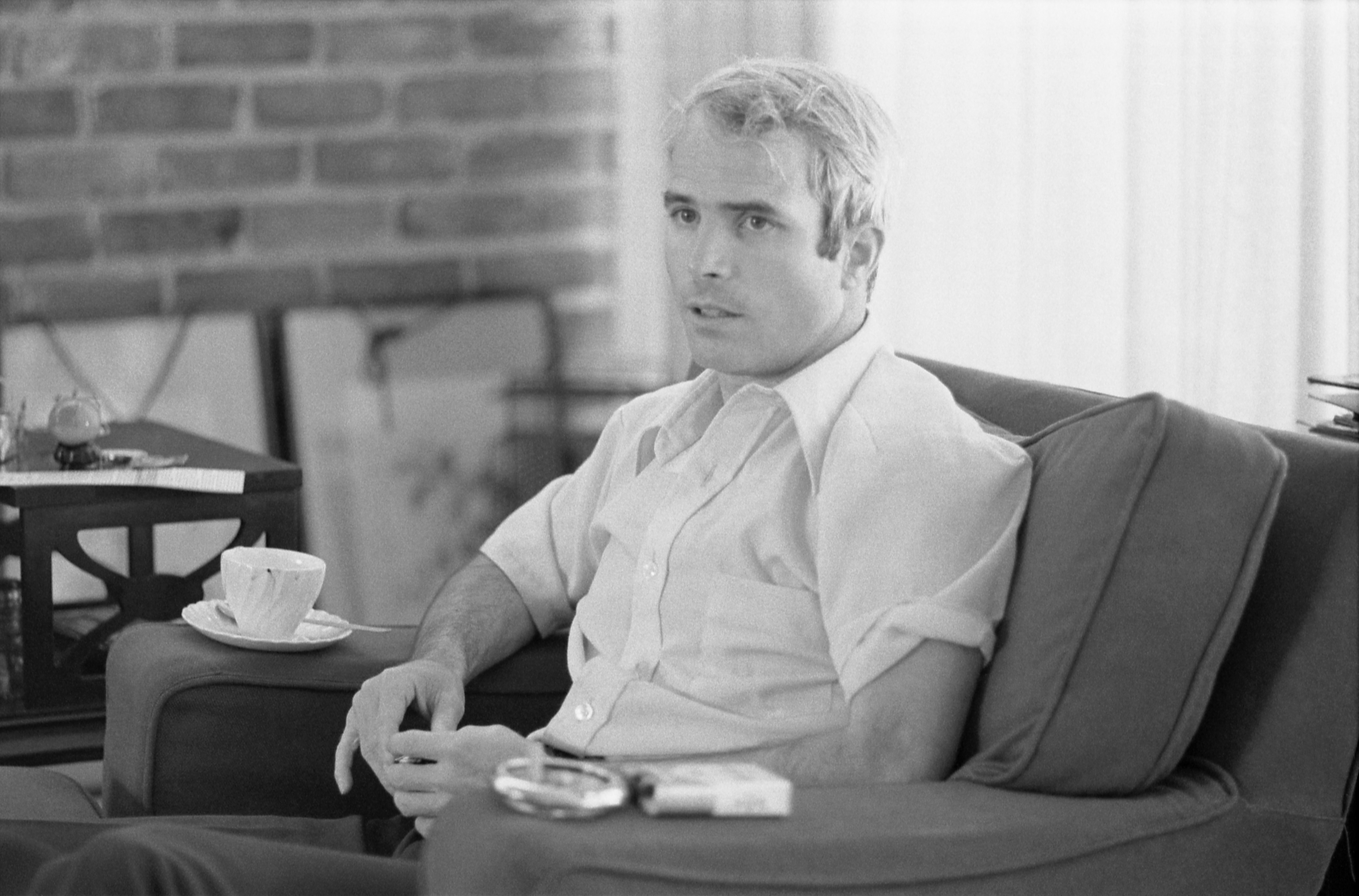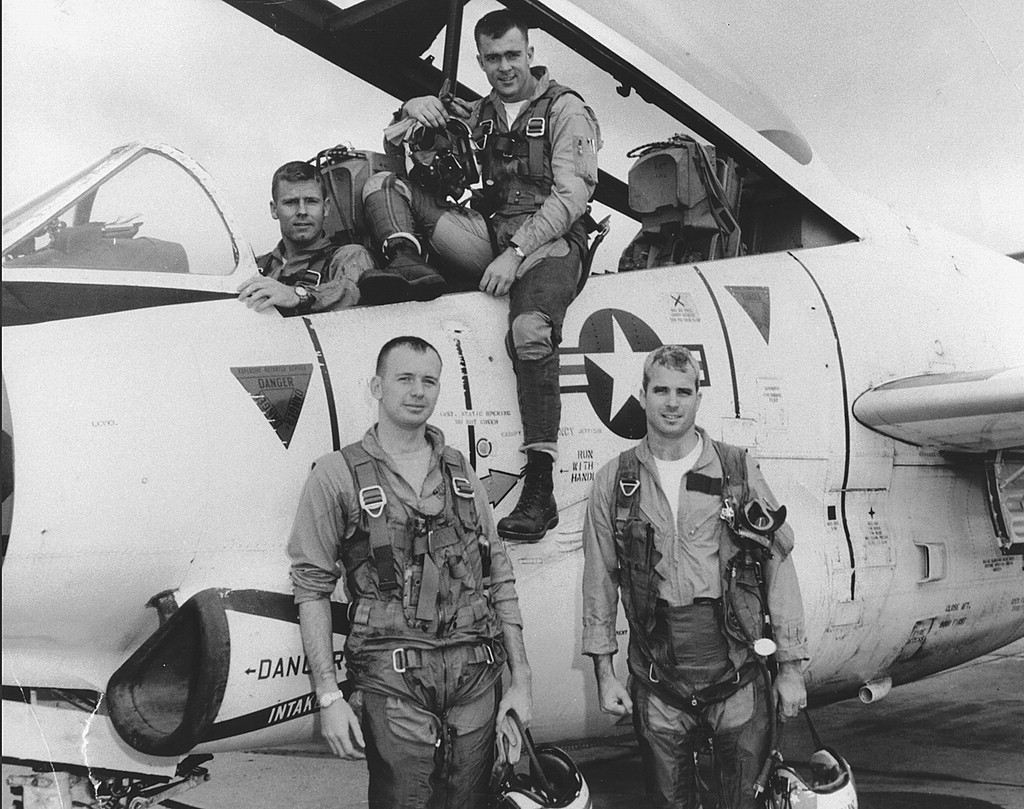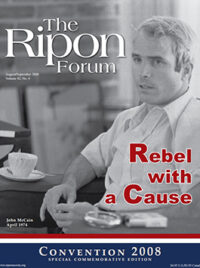 The picture is a classic cool. A cup of coffee in front of him, cigarettes and an ashtray to his left, the young man stares past the camera, a look of burning intensity in his eyes. His hair is slightly tousled. He looks like he could be James Dean. But it’s not — it’s John McCain.
The picture is a classic cool. A cup of coffee in front of him, cigarettes and an ashtray to his left, the young man stares past the camera, a look of burning intensity in his eyes. His hair is slightly tousled. He looks like he could be James Dean. But it’s not — it’s John McCain.
Taken in 1974, just over a year after McCain was freed from captivity in Vietnam, the picture strikes a chord because it captures a spirit shared by both men – the spirit of independence. But that’s where comparisons must end. For if James Dean is remembered for being a rebel without a cause, John McCain is known for being just the opposite. He is a rebel with a cause, that being the United States, the country he has served his entire adult life.
Indeed, since his 18th birthday, John McCain has served the United States in one capacity or another. First as a midshipman at the Naval Academy and subsequently as an aviator over the skies of North Vietnam, John McCain’s devotion to duty was borne not only of his legendary Naval bloodlines but of an overarching commitment to the idea that the United States is, first and foremost, a force for what is good and right in the world. Continuing his service in the United States Congress, McCain has displayed convictions that sometimes put him at odds with those in his own party and built his reputation as a maverick. But he never deviated from his ideals. Nowhere have those principles shown through more than in the areas of national security and government spending.
McCain’s military service to his country is the stuff of books, movies and military folklore. His upbringing and career in the United States Navy provide him keen insight on matters of international security. This vision goes far beyond the experience he gained in the cockpit of an A-4 Skyhawk, however. Because of his unique experiences in the military, and afterward, McCain understands the nature of armed conflict, what exactly it means to put young men and women to harm’s way and that war is not an effort to be lightly undertaken. Having personally seen the face of evil and its lack of conscience, McCain is uniquely qualified to lead the United States in its continuing efforts against the likes of al Qaeda and similar extremist organizations. He understands that, while negotiations and diplomacy should generally be preferable to military force, there are instances in which an implacable enemy will see any such discussions as a sign of weakness. Much like Teddy Roosevelt a century ago, John McCain knows that positions of strength often lead to peace faster than those of weakness.
 In our current conflicts, John McCain has been outspoken in his criticism of strategies he believed, and turned out to be, flawed and unnecessarily imperiling those in uniform. As far back as 2003, he beat the drum that securing the peace in Iraq would be a far harder goal to accomplish than winning the military conflict. His calls for additional troops were finally heeded early in 2007. While knowing full-well that supporting General David Petraeus’ surge-strategy might be politically risky, McCain pulled no punches. As he famously stated, he would, “rather lose an election than a war.” Taking a critical look at the security situation in Iraq, sitting down with General Petraeus to get an unvarnished view of the plan, McCain knew that the surge must be given the time to accomplish its goals; indeed it has paid dividends with increased security for Iraqis and combat casualties among American troops falling precipitously. While the surge has shown short-term success, McCain knows the conflict is not yet over.
In our current conflicts, John McCain has been outspoken in his criticism of strategies he believed, and turned out to be, flawed and unnecessarily imperiling those in uniform. As far back as 2003, he beat the drum that securing the peace in Iraq would be a far harder goal to accomplish than winning the military conflict. His calls for additional troops were finally heeded early in 2007. While knowing full-well that supporting General David Petraeus’ surge-strategy might be politically risky, McCain pulled no punches. As he famously stated, he would, “rather lose an election than a war.” Taking a critical look at the security situation in Iraq, sitting down with General Petraeus to get an unvarnished view of the plan, McCain knew that the surge must be given the time to accomplish its goals; indeed it has paid dividends with increased security for Iraqis and combat casualties among American troops falling precipitously. While the surge has shown short-term success, McCain knows the conflict is not yet over.
In a speech given in mid-May, McCain outlined what he believed would be accomplished at the conclusion of his first term as president. Amongst the goals are bringing home most combat troops from Iraq while leaving a small security presence; Iraq and the Middle East will continue to be potential hot buttons for violence and unrest. In addition, he would keep up the pressure on al Qaeda in the Taliban in Afghanistan, understanding that a forward-leaning posture against potential terrorists is far more likely to keep Americans safe at home. However, our security concerns don’t end with Iraq and Afghanistan. In an increasingly dangerous world, McCain proposes to work with powers such as Russia and China to ensure that the nuclear programs of rogue states are abandoned in the name of international peace and security.
McCain has displayed convictions that sometimes put him at odds with those in his own party and built his reputation as a maverick. But he never deviated from his ideals.
In concluding his plans for the military during his administration, McCain makes note that he would overhaul the way the Pentagon acquires new weapons systems and bids out contracts providing enough money to pay for an enlarged armed forces. On this particular topic, John McCain has rankled both sides of the aisle as he has time-and-again brought daylight to poorly executed acquisition contracts. Most notably, he saved the Treasury billions of dollars when he publicly objected to a program to award an Air Force tanker deal that could be considered no less than a boondoggle. In its wake, the contract has been re-let and officials from both Boeing and the U.S. Air Force went to prison.
When it comes to wasteful government spending, McCain has never shied away from the opportunity to call out the most egregious examples. In the wake of the disastrous 2006 mid-term elections, McCain blamed his own party for the outcome. “We went to change Washington and Washington changed us,” he often says during town hall meetings. Well aware that the spending excesses of the Republican-controlled Congress severely damaged the brand, McCain is fighting to regain the mantle of fiscal conservative for the GOP.
Congressional earmarks and other forms of ‘pork-barrel’ spending have been some of McCain’s favorite targets. Glaring examples such as Alaska’s ‘bridge-to-nowhere’ have provided him with unfortunate examples of what can happen when the majority party becomes too comfortable with itself. Several times, to the chagrin of both fellow Republicans and Democrats, McCain has pushed to ban earmarks from any and all legislation. As President, he’s vowed to veto any bill that comes to his desk that contains earmarks with a promise to “make the authors famous.”
More than reining in earmarks, however, McCain is committed to the very Reaganesque ideal of reforming the federal government as a whole. In addition to providing increased efficiency across the bureaucracy, the resulting reduction in outdated and unnecessary programs would help alleviate some of the pressure on the already burgeoning federal deficit. This coincides nicely with his opposition to tax increases; the less money the government needs, the less it has to take from the people to whom it is supposed to answer, namely its citizens.
When voters go to the polls this November, the contrast between their choices for President will be clear. When it comes to two of the most pressing issues our country faces today, the threat of terrorism and government spending, John McCain’s long and distinguished positions on both will be on display.
He is a realist, someone who understands not only that the world remains a dangerous place, but that mortgaging our children’s future under a mountain of debt will make us less secure. Beyond that, he is also someone who is unafraid to go against the grain and buck conventional wisdom if he believes it will help the American people.
John McCain truly is a rebel with a cause, and someone whose life has uniquely prepared him to be our next President of the United States.
Reed Galen is a political strategist and former aide to John McCain.




